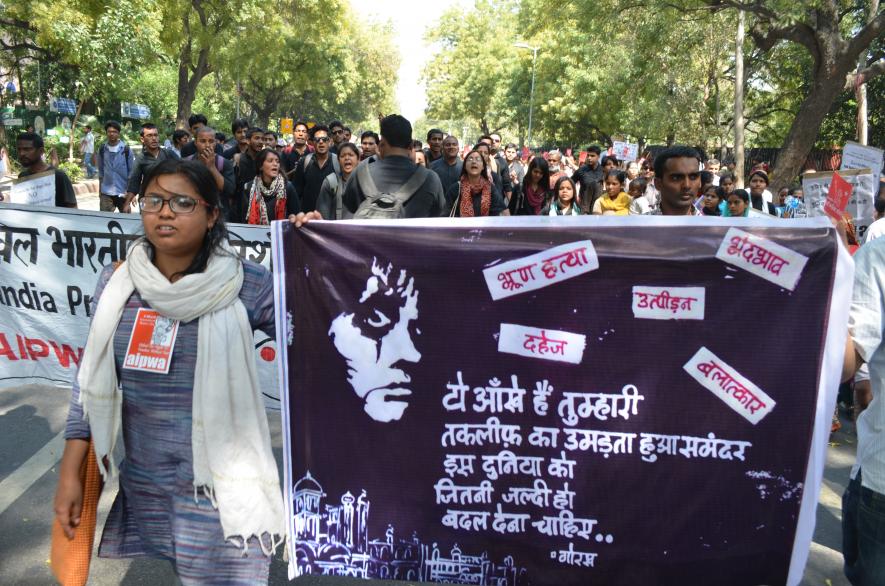Anti-Women Pratices: The Case of the Two-Finger Test
In 1974, Mathura was raped by two policemen inside a police station.
The policemen were acquitted by the Sessions Court but convicted by the Bombay High Court, only to be acquitted again by the Supreme Court in 1979. The Supreme Court had held that since Mathura did not raise any alarm and was "habituated to sex," she must have consented to sexual intercourse with the policemen. "Because she was used to sex, she might have incited the cops (they were drunk on duty) to have intercourse with her," the judge had said.
Section 155(4) of the Indian Evidence Act (1872) prohibits any evidence about the “bad character” of the accused. Bad character, here, means previous convictions on similar charges. But the same Section allowed the Defence to show that the alleged victim is of 'immoral' character. ‘Immoral,’ here, has been interpreted to mean a promiscuous woman. On the recommendation of the Law Commission, Section 155 (4) was deleted and a proviso to Section 146 was inserted stating that during cross-examination, a victim of rape can no longer be questioned about her past sexual conduct or character.

Even as cross-examination of the woman on her sexual history was disallowed, obsession with it continued. Convictions and acquittals were influenced by the two-finger test that continued to provide medical evidence of a woman's sexual experience. In Vinay Krishna Ghatak versus State of Rajasthan, 2003, the Rajasthan High Court observed, "That the fact that the prosecutirx was unmarried girl and she was habitual to intercourse further goes to show that she was a consenting party."
The two-finger test, widely rebutted by many women's groups, checks for laxity or looseness of the vagina (whether the woman is habituated to sex) and old or new tears on the hymen (whether the woman was a virgin before the alleged sexual assault).
In cases where the hymen is found to have old tears and the vagina lax, it has been used to conclude that the woman is 'habituated to sex.' And then begins the character assassination of the rape survivor in the courtrooms across India. The statement of the rape survivor weakens as her sex life becomes the area of interest. She is soon named 'a woman of loose morals.'
The demand to ban the two-finger test is rested on two major reasons. First, a woman's past sexual experience should be irrelevant to the judiciary deciding the case. Probing into the sex life of a woman is a violation of her right to privacy.
Second, the two-finger test is not only sexist but unscientific in gauging a woman's sexual behaviour. The test is conducted on the presumption that in a virgin woman, a one-time sexual intercourse (the alleged rape) will lend new tears to the hymen, while old tears will reveal the woman being habituated to regular sexual intercourse. The hymen is not a wall that breaks during sexual intercourse. It is a thin layer of tissue that partly covers the opening to the vagina. It is not an indicator of virginity.
By contrast, hymens are unrelated to a woman's virginity. They could tear during childhood or puberty. Activities such as dancing, stretching, horse riding, running, swimming, jumping, masturbation, usage of tampons, or accidents can also tear the tissue. During menstruation, clots in the blood create pressure which could lead to tears in the hymen. Tearing of the hymen does not always lead to bleeding or pain. Some women are born without a hymen; some are born with a hymen so flexible that it does not tear even during a sexual intercourse.
The two-finger test is a colonial practice that has carried on unchallenged," says Dr. Pratiksha Baxi, Assistant Professor, Centre for the Study of Law and Governance. She said that in colonial times, the French and British jurisdiction classified women into 'true virgins' and 'false virgins' in cases of rape. It was believed that inserting two fingers into the vagina of a woman could tell a true virgin from a false one. "It is a patriarchal inheritance of a colonial law that has expanded into good women and bad women," she says.
The Delhi High Court in an Order in 2009 issued a set of guidelines drafted by the Delhi Commission for Women to be followed in cases of sexual assault. The draft proclaims usage of the SAFE (Sexual Assault Forensic Evidence) kit to assess sexual assault. In January 2013, the Department of Health and Family Welfare of the Government of Delhi issued a set of guidelines for rapid response by hospitals in case of MLC (Medico-legal certificate) examination of victims of sexual assault. It enclosed a copy of the 2009 Delhi High Court Order.
"The SAFE kit is a box of certain things suggested by the Delhi High Court. Still, protocol was an issue," says Deepa Venkatachalam from Sama, a resource group for women and health. Modern forensic science in any criminal case can strengthen the prosecution. "Medical evidence is crucial when a child or a person with disability is not able to articulate what has happened to him or her. One can have a medical protocol which is sensitive," says Dr. Baxi.
But in "Responding to Sexual Assault: A Study of Practices of Health Professionals in a Public Hospital," Sama and CEHAT point out that after the evidence was handed over to the police, it was kept in the store house of the police station before being sent over to the forensic laboratory. Often doctors who performed the medical examination on the victim do not get the reports back from the forensic labs for final opinion.
A health system that is not only sensitive but skilled becomes crucial in cases of violence. But most often doctors do not have the time or the inclination to discuss with a rape survivor the process of the medical examination, or to offer psychological help. A uniform medical protocol needs to be set up, and the archaic procedure of the two-finger test should be done away with.
The Supreme Court, too, has recently held that the two-finger test violates the right to privacy of a woman, and is immaterial because previous sexual history has no relevance to the rape case under consideration. The SC has asked the government to offer better medical procedures to confirm sexual assault.
"The onus is also on law publishers. It is important to revise the textbooks on medical jurisprudence," says Dr. Baxi. This is crucial to change the consciousness of medical and law practitioners in regard to cases of sexual assault, and to disenchant the society with Victorian prudishness.
Disclaimer: The views expressed here are the author's personal views, and do not necessarily represent the views of Newsclick
Get the latest reports & analysis with people's perspective on Protests, movements & deep analytical videos, discussions of the current affairs in your Telegram app. Subscribe to NewsClick's Telegram channel & get Real-Time updates on stories, as they get published on our website.
























